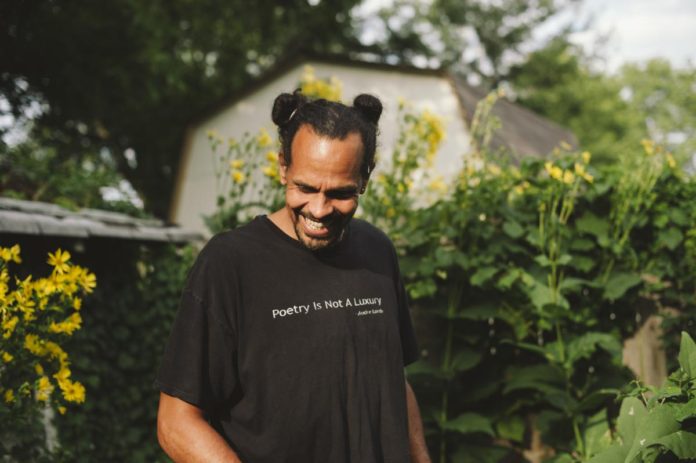
“Friends,” Ross Gay addresses listeners in the first seconds of “Catalog of Unabashed Gratitude.” With that, he welcomes us into a poetic orchard where he cultivates thanks for both the mundane and tragic experiences that make us human. Set against a shimmering soundscape by Bon Iver, Gay performs the titular poem from his widely-lauded 2015 book. The result of this collaboration between an acclaimed poet and indie star is a profoundly joyful treatise on what it means to live life consciously and appreciatively.
“Catalog” comes as the first track of Jagjaguwar’s newly released 25th anniversary record “Dilate Your Heart.” Indie diehards may know Jagjaguwar as the label backing artists like Sharon Van Etten, Angel Olsen and, of course, Justin Vernon, frontman of Bon Iver. In fact, the drone-filled music behind “Catalog” echoes Vernon’s cover of Van Etten’s “Love More,” cementing Gay’s track as a true complement to Jagjaguwar’s well-curated lineup of indie music. Yet, “Catalog of Unabashed Gratitude” resists categorization as spoken word poetry or contemporary music — perhaps because gratitude requires a new form.
Gay reads in a voice that is proclamatory, resonant and clear. He has come here “to holler.” However, rather than spectators to an onstage slam performance, Gay’s reading situates us as visitors in his home, sitting on “the corduroy couch [he has] put [us] on.” He even thanks us, the listeners, “for staying here with me / for moving your lips just so as I speak.” He gives us “a cup of tea. [He has] spooned honey into it.” In those lines, the poem becomes an offering rather than a purely performative act. After all, Gay takes us to “the realest place” he knows: a community garden in Indiana. Gay even produces “a bowl of blackberries from the garden,” and just as quickly as he conjures that sweetness, he gives it away to us, saying, “I picked them just for you.”
Poets and creative writers from the modern workshop era — in which writers are often encouraged to hone, cut and pare down language — will likely recognize that the tumbling excess and meanderings of Gay’s language is different. That is not to say that Gay’s language is cluttered or imprecise. Far from it.
The poem succeeds because Gay’s detailed, expansive catalog proves just how much we have to appreciate in the world, from the “zinnia, and gooseberry, rudbeckia and pawpaw” flowers to the “baggie of dreadlocks [Gay] found in a drawer / while washing and folding the clothes of [his] murdered friend.” Compared to the excess of human experience in the world, we are so small: “There is a fig tree taller than you in Indiana / it will make you gasp / it might make you want to stay alive even.”
In response to Gay’s blooming language, Bon Iver’s music takes on a subtle yet powerful supporting role. The most accurate way I can describe the music is that it evokes the feeling of an interstellar religious ceremony celebrating sunrise on an alien planet. Vernon creates a soundscape with two main layers: the tremendous rattling of background synths set against clear tones that weave in and out, accommodating Gay’s words the way we might imagine a “river bends around the elephant’s / solemn trunk.”
The music reaches its zenith at the end of the track. Gay moves into the final question of his poem, and the music starts to fade. In giving way to silence, Bon Iver co-creates the feeling of awakening from a dream or coming up from being underwater. Gay’s voice meets us on the other side of that dream.
I am reminded, in that moment, of Bon Iver’s song “Heavenly Father,” a piece written for the movie “Wish I Was Here” and with the same trance-like, religious quality. In that song, Vernon sings, “I was never sure how much of you I could let in.” I’d like to sit that song next to Gay’s poem and imagine how Gay would answer that worry. I’d like to think he would say to let in everything and everyone.
After all, Gay acknowledges that life is “so much worse than we think,” and its end comes sooner than we ever expect. His poem unfurls into a question about life’s meaning: “What do you think / this singing and shuddering is, / what this screaming and reaching and dancing / and crying is?” When I reach this question, I think I understand. Gay’s entire poem has been rising to give the answer he affirms, in the end, so simply. The poem lives in praise of “loving, what every second goes away.” And we ought to consider living in this way, too.








